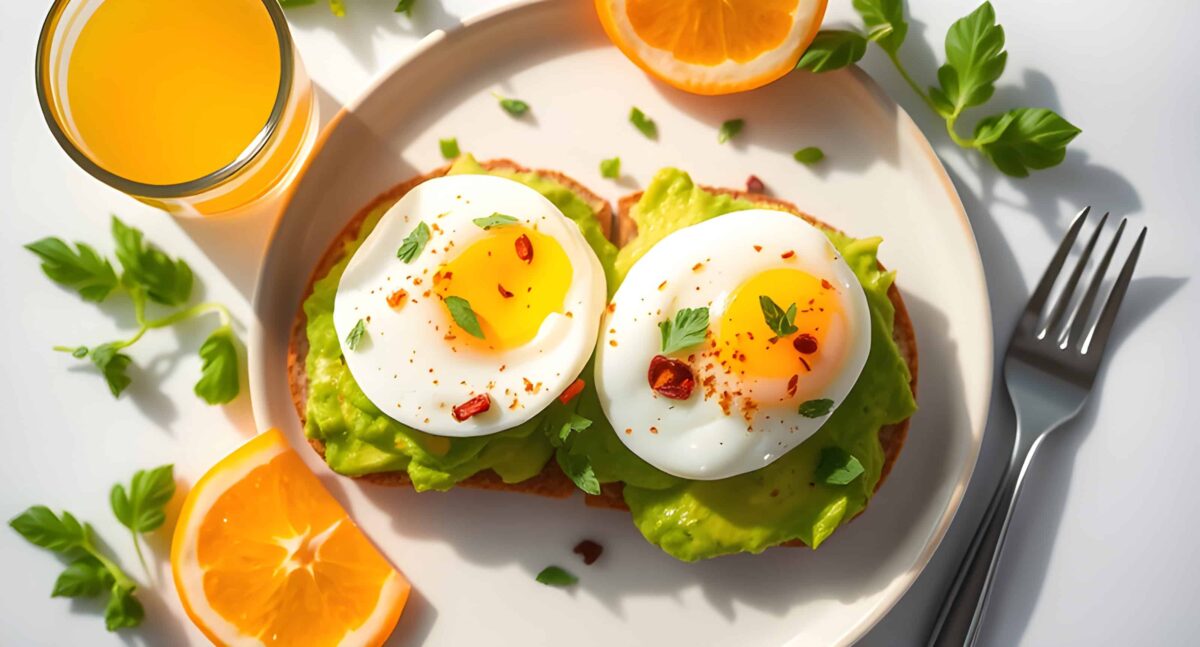Eggs are packed with protein and are a cornerstone of a healthy diet. Understanding the best practices for Healthy Egg Eating is essential to maximize their nutritional benefits. They provide a fantastic way to kickstart your day with a high-protein breakfast.
One of the best things about eggs is their versatility. Whether boiled, scrambled, poached, or baked, they can be prepared in countless ways, making them an excellent addition to any meal.
Exploring the benefits of eggs and learning how to incorporate them into your diet can significantly enhance your health. From the fundamentals of egg nutrition to the debate over egg whites versus yolks, there’s so much to uncover. This guide dives deep into Healthy Egg Eating, offering tips on finding the healthiest way to eat eggs, delicious high-protein breakfast ideas, and a detailed look at the nutritional advantages eggs bring to the table.

1. Understanding Egg Nutrition: A Complete Protein Package
Eggs are packed with essential vitamins, minerals, and high-quality protein, making them an excellent choice for a healthy diet. Rich in vitamins D and B12, as well as minerals like zinc and iron, eggs provide essential nutrients for overall wellbeing.
A large egg contains about 70 calories, 6 grams of protein, 5 grams of fat, and almost no carbs. This nutritional profile makes eggs ideal for those looking to add more protein without significantly increasing calorie intake. For instance, Eggs Benedict Calories can vary depending on preparation but typically provide a satisfying balance of protein and energy.
Why Eggs Are a Nutritional Powerhouse:
- High-Quality Protein: Eggs are a complete protein source, containing all nine essential amino acids.
- Rich in Vitamins and Minerals: Eggs offer key nutrients like vitamins D, B12, and iron.
- Low in Calories: With a low-calorie count, eggs are perfect for weight management diets.
Dishes like Eggs Benedict not only highlight the versatility of eggs but also demonstrate how they can fit into a balanced diet. While the Eggs Benedict Calories may be higher due to added ingredients like hollandaise sauce and English muffins, this classic dish still delivers the nutritional benefits of eggs.
Incorporating eggs into your meals can support healthy weight management, boost energy, and provide essential nutrients. With their high protein content and low-calorie count, eggs remain a top choice for better health and wellbeing.
| Nutrient | Amount per large egg |
|---|---|
| Calories | 70 |
| Protein | 6 grams |
| Fat | 5 grams |
| Carbohydrates |
2. The Great Debate: Egg White vs. Egg Yolk
The debate over egg whites and yolks has been ongoing. Egg white vs egg yolk is a big question for those who care about their health. Egg whites are packed with protein, making them a favorite among athletes and those who want to eat more protein.
Egg yolks, on the other hand, are often seen as high in cholesterol. But they also have important vitamins and minerals.
Looking at the egg white vs egg yolk debate, we see their nutritional differences. Egg whites are low in calories and high in protein, great for weight loss or muscle gain. Egg yolks, while higher in calories, offer vitamins D, B12, and iron. The egg nutrition benefits of yolks should not be ignored.
Here are some key points to consider when evaluating egg white vs egg yolk:
- Egg whites are high in protein and low in calories
- Egg yolks are rich in essential nutrients like vitamins and minerals
- Egg yolks are higher in calories and cholesterol, but also provide egg nutrition benefits
In conclusion, the egg white vs egg yolk debate is complex. Both egg whites and yolks offer unique egg nutrition benefits. The right choice for you depends on your needs and goals. By understanding their nutritional values, you can make a smart choice and enjoy the benefits of eggs.
| Nutrient | Egg White | Egg Yolk |
|---|---|---|
| Protein | High | Medium |
| Calories | Low | High |
| Vitamins and Minerals | Low | High |

3. What is the Healthiest Way to Eat Eggs?
There are many ways to cook eggs, each with its own benefits and drawbacks. The best method depends on personal taste, but some are healthier than others. Boiling, poaching, and scrambling are popular, but which is the healthiest?
Boiled eggs are low in calories and high in protein. They also have lots of vitamins and minerals, making them great for a healthy diet. To keep them nutritious, it’s important to cook them right. Temperature control is key, as overcooking can reduce nutrients.
- Boiling: Place eggs in a single layer in a saucepan, cover them with cold water, and bring to a boil. Remove from heat and let sit for 12-15 minutes.
- Poaching: Crack an egg into a bowl, then slide it into a pot of simmering water. Cook for 3-5 minutes, or until the whites are set and the yolks are cooked to desired doneness.
- Scrambling: Beat eggs with a fork or whisk, then heat a non-stick pan over medium heat. Add a small amount of oil or butter, then pour in the eggs. Cook, stirring constantly, until the eggs are set.
By following these tips and choosing the right egg cooking methods, you can enjoy the many benefits of eggs while minimizing nutrient loss.
4. Benefits of Different Cooking Methods
Choosing how to cook eggs can greatly influence their nutritional value and health benefits. For instance, scrambled eggs offer numerous health benefits by retaining the protein and vitamins found in eggs. When comparing poached eggs vs. fried eggs, poaching is often the healthier choice since it avoids the use of extra oil.
Adding ingredients to egg dishes can further enhance their nutritional profile. Vegetables like spinach or bell peppers make scrambled eggs more nutrient-dense, while whole grains like brown rice or quinoa boost fiber content.
Here are some benefits of different cooking methods:
- Retains protein and vitamins: Scrambled and poached eggs
- Low calorie count: Poached eggs
- High fiber content: Egg dishes with whole grains
For a deeper dive into egg-based meals and whether dishes like Eggs Benedict make a good breakfast option, check out this guide on Eggs Benedict and breakfast nutrition.
The table below illustrates how cooking methods and added ingredients impact the nutritional value of eggs.
| Cooking Method | Calories | Protein | Fiber |
|---|---|---|---|
| Scrambled eggs | 180 | 18g | 0g |
| Poached eggs | 140 | 12g | 0g |
| Eggs with whole grains | 250 | 15g | 5g |

5. Boiled Eggs: A Nutritional Powerhouse
Boiled eggs are a fantastic way to add protein to your meals. They are versatile and can be enjoyed in many ways. Whether you like them soft or hard, they bring health and taste to your dishes.
The cooking time is key when boiling eggs. Optimal boiling times affect the eggs’ texture and nutritional value. Soft-boiled eggs need 6-7 minutes, while hard-boiled eggs take 10-12 minutes.
Boiled eggs are perfect for healthy dishes like salads or as a quick snack. Here are some tips for storing and preparing them:
- Keep boiled eggs in the fridge for up to a week.
- Use them in egg salad or as a topping for soups.
- Prepare them ahead for a quick, easy snack.
Adding boiled eggs to your diet can boost your health. They are packed with protein, vitamins, and minerals. This makes them a top choice for those looking to eat healthier.
6. Poached and Scrambled: Comparing Health Benefits
When it comes to poached eggs vs fried eggs, the health benefits are different. Poached eggs are low in calories because they’re cooked without oil. Scrambled eggs can be healthier than fried eggs if made with little oil and simple ingredients.
Looking at scrambled eggs health benefits compared to other ways of cooking, we see a key point. Poached eggs keep more nutrients like protein and vitamins. Scrambled eggs might lose some of these nutrients if overcooked.
Here are some key points to consider when choosing between poached and scrambled eggs:
- Poached eggs are low in calories and rich in protein
- Scrambled eggs can be high in calories if cooked with excessive oil and ingredients
- Both poached and scrambled eggs are good sources of essential vitamins and minerals
The choice between poached and scrambled eggs depends on what you like and your diet needs. Knowing the health benefits of each helps you choose eggs that fit into a healthy diet.
By looking at the nutritional content and health benefits of poached and scrambled eggs, you can enjoy them in a balanced diet. Whether you like poached eggs vs fried eggs or scrambled eggs, there are many ways to add eggs to your meals and enjoy their health benefits.
| Cooking Method | Calories per Serving | Protein Content |
|---|---|---|
| Poached Eggs | 70-80 calories | 6-7 grams |
| Scrambled Eggs | 100-150 calories | 6-7 grams |
7. Organic vs. Conventional Eggs: Making the Right Choice
Choosing between organic and conventional eggs can be tricky. Many wonder if organic eggs are better. Egg nutrition benefits are clear, but do organic eggs have more to offer?
Organic eggs come from chickens that eat organic feed and get to roam outside. Conventional eggs, on the other hand, may come from chickens in cages and eat non-organic feed.
Nutritional Differences
Looking at the nutrition in organic and conventional eggs shows some big differences. Here’s a quick comparison:
| Egg Type | Protein Content | Omega-3 Fatty Acids | Antibiotics |
|---|---|---|---|
| Organic | 6-7 grams | Higher levels | No antibiotics |
| Conventional | 5-6 grams | Lower levels | May contain antibiotics |
Environmental Impact
Organic and conventional egg farming have different effects on the environment. Organic farming is often better for the planet. It uses organic feed and lets chickens roam outside.

8. Incorporating Eggs into a Healthy Diet Plan
Eggs are a versatile food that can be easily added to any meal. They boost protein and essential nutrients. For a high protein breakfast, try egg recipes like omelets or scrambled eggs with veggies. These dishes are tasty and a great way to start the day.
Eggs can also be added to various dishes for lunch and dinner. Here are some ideas:
- Egg salad with whole grain bread or crackers
- Grilled chicken or fish with roasted veggies and a fried or poached egg
- Vegetable stir-fry with scrambled eggs and brown rice
These are just a few ways eggs can fit into a healthy diet. With their high protein and versatility, eggs are a great addition to any meal.
| Meal | Egg Recipe Idea | Protein Content |
|---|---|---|
| Breakfast | Scrambled eggs with spinach and whole grain toast | 22 grams |
| Lunch | Egg salad with mixed greens and whole grain crackers | 18 grams |
| Dinner | Grilled chicken with roasted vegetables and a fried egg | 35 grams |
Adding eggs to your diet can boost your protein intake. You can enjoy healthy egg dishes for breakfast, lunch, or dinner. There are many ways to make eggs a part of your healthy diet plan.
9. Maximum Health Benefits: Timing and Frequency
To get the most out of eggs for health, timing and frequency matter. Eggs are great for weight loss because they’re high in protein and low in calories. Finding the right balance is key to enjoying eggs for health.
Eating eggs 3-4 times a week is a good starting point. You can have scrambled eggs for breakfast, a hard-boiled egg as a snack, or add them to a salad for lunch. Your egg-eating frequency depends on your calorie needs and diet goals.
Some benefits of eating eggs include:
- High-quality protein for muscle growth and maintenance
- Essential vitamins and minerals like vitamin D and choline
- Low in calories, perfect for weight loss diets
Adding eggs to your diet is easy and tasty. Try them in your favorite dishes or explore new ways like poaching or baking. By balancing eggs in your diet, you can enjoy their nutritional benefits and support your health.
| Egg Consumption | Frequency | Benefits |
|---|---|---|
| 3-4 times a week | Part of a balanced diet | Supports muscle growth, provides essential vitamins and minerals |
10. Safety Considerations and Best Practices
When it comes to eggs, egg safety is crucial. To avoid foodborne illnesses, it’s important to handle and store eggs right. Keep them refrigerated at 40°F (4°C) or below and use them within a few weeks.
Here are some key food safety tips to remember:
- Always check eggs for visible cracks or damage before purchasing
- Store eggs in their original carton to prevent moisture from accumulating
- Keep eggs away from strong-smelling foods, as they can absorb odors easily
By following these simple guidelines, you can ensure egg safety and enjoy your eggs with confidence. Always prioritize food safety tips when handling and consuming eggs to avoid illness.
It’s also important to know how to pick quality eggs. Look for eggs that are clean, dry, and have no cracks. By taking these precautions and following proper food safety tips, you can enjoy eggs’ nutritional benefits while staying safe and healthy.
11. The Healthy Recipe
Print
Baked Egg and Vegetable Breakfast Cups
- Total Time: 30 minutes
- Yield: 6 cups
Description
These Baked Egg and Vegetable Breakfast Cups are a delightful way to combine protein-packed eggs with fresh, vibrant veggies. Perfect for busy mornings, they offer a nutritious and satisfying meal in a convenient grab-and-go format.
The recipe is incredibly versatile—swap in your favorite veggies or add spices to suit your taste. These egg cups are also great for meal prep, as they stay fresh in the fridge and reheat beautifully. Whether you’re fueling up for a busy day or enjoying a relaxed brunch, these breakfast cups are sure to become a favorite.
Ingredients
– 6 large eggs
– 1/2 cup diced bell peppers (red, yellow, or green)
– 1/2 cup chopped spinach
– 1/4 cup diced onion
– 1/4 cup shredded cheese (cheddar, mozzarella, or your choice)
– 1/4 teaspoon salt
– 1/4 teaspoon black pepper
– 1/4 teaspoon paprika (optional)
– Olive oil or cooking spray for greasing
Instructions
1. Preheat your oven to 375°F (190°C) and lightly grease a 6-cup muffin tin with olive oil or cooking spray.
2. In a medium-sized bowl, whisk the eggs until fully combined. Add salt, pepper, and paprika if using, and mix well.
3. Evenly distribute the diced bell peppers, spinach, and onion into the prepared muffin cups.
4. Pour the whisked eggs into each muffin cup, filling them about 3/4 full. Sprinkle shredded cheese on top of each cup.
5. Bake in the preheated oven for 18-20 minutes, or until the eggs are fully set and slightly golden on top.
6. Allow to cool for 5 minutes before removing from the tin. Serve warm or store in the refrigerator for up to 3 days.
- Prep Time: 10 minutes
- Cook Time: 20 minutes
FAQ
What are the benefits of eating eggs?
Eggs are full of protein and vitamins like D and B12. They also have minerals like zinc and iron. Eating eggs can give you energy and support your health.
How do the health benefits of scrambled eggs compare to fried eggs?
Scrambled eggs are healthier than fried eggs. They use less fat and keep more nutrients. Fried eggs might take in unhealthy fats from oil, making them less healthy.
What are the differences between organic and conventional eggs?
Organic eggs come from hens without synthetic stuff. They might have a bit more nutrients. But, the main benefits are for animal welfare and the environment, not just nutrition.
What are some healthy high-protein breakfast ideas involving eggs?
Try boiled eggs, scrambled eggs with veggies, egg muffins, or egg sandwiches on whole-grain bread. Add foods like avocado and spinach for a nutritious breakfast.
How often should I eat eggs for optimal health?
Eating up to one egg a day is okay, say health groups. But, it depends on your health goals and diet. Make sure to balance eggs with other healthy foods.
Conclusion
Eggs are a fantastic source of nutrition, offering high-quality protein and essential nutrients. They are versatile and provide countless options for healthy egg dishes. Incorporating Healthy Egg Eating into your daily meals can significantly improve your overall health.
Whether you prefer them boiled, poached, or scrambled, eggs are both delicious and nutritious. Experiment with different cooking methods to discover your favorites, or get creative with egg-based recipes that work for any meal of the day.
Good nutrition is essential for a healthy lifestyle. Regularly including eggs in your diet can boost your energy levels and support heart health. By embracing Healthy Egg Eating, you’ll take a simple yet powerful step toward enhancing your wellness. Enjoy the many benefits eggs have to offer—your body will thank you!

